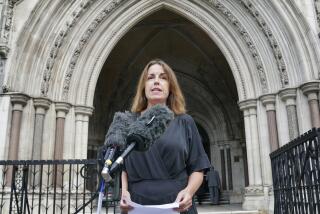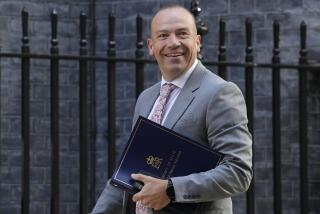Britain Orders New Probe of N. Ireland’s ‘Bloody Sunday’
LONDON — It started 26 years ago as a civil rights march in downtown Londonderry, the largest Catholic-majority city in Northern Ireland. It ended in tragedy that has festered ever since, a defining moment in hatreds that divide Roman Catholics and Protestants across the bloodied province.
Offering a powerful gesture of conciliation to Catholics, British Prime Minister Tony Blair on Thursday ordered a new investigation of “Bloody Sunday,” the fatal shooting of 14 civil rights marchers by British paratroopers on Jan. 30, 1972.
In context, Blair’s initiative is a confidence-building measure geared to advancing a peace process mired in the refusal by either side to compromise on the future of the six-county province.
To reconsider “Bloody Sunday” is a gamble. Blair’s action risks inflaming some Protestants as well as sentiments disquieting a British army that has suffered steady casualties in Northern Ireland.
But Blair and his allies have made clear that now is the time to tackle the toughest issues, including this historic incident, which many measure as a flash point from which the sectarian violence escalated significantly.
Blair told Parliament that fresh witnesses and ballistic and medical evidence justified a new inquiry, and he named Lord Saville, a senior judge, to head it. The jurist will be joined by two judges still to be named but likely to be from British Commonwealth nations.
“At last a member of the British establishment understands why Bloody Sunday is important,” said Angela Heggarty, a spokeswoman for the relatives of the victims.
Blair stopped short of the apology long-sought by relatives, but his action went beyond what Northern Ireland Protestants could easily accept. “Reopening old wounds like this is likely to do more harm than good,” snapped David Trimble, leader of the province’s largest Protestant party.
Citing their separate litanies of outrage after three decades of killing that have claimed 3,200 lives, Catholics and Protestants can’t even agree on the name of the city where the marchers died. Officially, it is Londonderry. But Catholics, who are a majority there although a minority in Northern Ireland over all, call the city Derry.
That long-ago Sunday turned bloody after Catholic marchers ignored a government ban and conducted a rally to protest the internment of Irish Republican Army suspects without trial. When troops moved into the Catholic Bogside neighborhood, the shooting began: 28 Catholics were hit, 14 fatally.
An official inquiry immediately after the incident found that the paratroopers had been fired upon first by IRA gunmen. That conclusion has been attacked ever since by Catholics, and, under former Prime Minister John Major, the British government accepted that the victims had all been unarmed.
Prodded by the Irish government, Britain’s co-sponsor at peace talks chaired by former U.S. Senate Majority Leader George J. Mitchell, Blair said the new inquiry will have the right to subpoena witnesses and compel disclosure of documents.
Blair said “Bloody Sunday” was different from other episodes of violence because the deaths came at the hand of the British army.
In Dublin, Irish Prime Minister Bertie Ahern, whose government had submitted a dossier of new evidence to Blair, welcomed the decision.
In Londonderry, the Most Rev. Edward Daly, the Catholic bishop who, as a priest, attended the dead and dying on “Bloody Sunday,” told reporters: “This has been a festering sore for 26 years, and it is about time it was healed--and the truth is a great healer.”
Blair said the commission of inquiry will set its own ground rules and time limits. Some of the testimony and all of the findings will be public, he said.
Catholics in Londonderry have always said that British soldiers came disposed to shoot and that the troops were responsible for the escalation of what had been a by-then routine exchange of stones and rubber bullets.
In interviews, army officers who commanded troops that day have strongly defended their behavior under difficult, hostile conditions.
After five acrimonious months of peace talks, the two sides in Northern Ireland are still at loggerheads. In an attempt to advance the talks, Britain and Ireland outlined an agenda earlier this month. But Sinn Fein, political arm of the IRA, objected to proposals for home rule in the province and creation of an intergovernmental “Council of the Isles” linking London and Dublin with new assemblies in Northern Ireland, Wales and Scotland.
More to Read
Sign up for Essential California
The most important California stories and recommendations in your inbox every morning.
You may occasionally receive promotional content from the Los Angeles Times.










